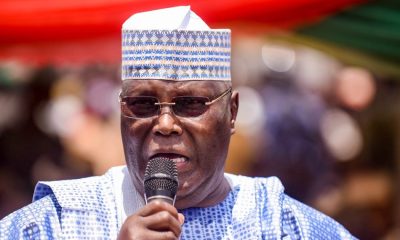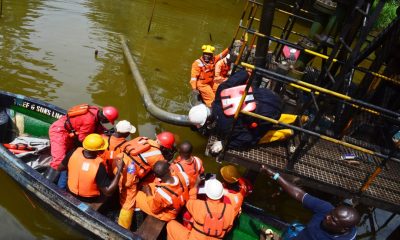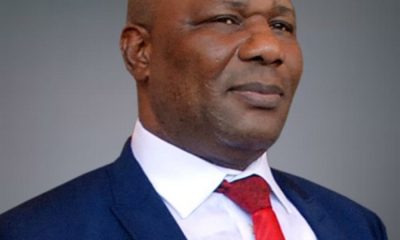BUSINESS
ACCI, Stakeholders Seek Emergency Declaration on Export Sub-sector

By Tony Obiechina, Abuja
The President, Abuja Chamber of Commerce and Industry (ACCI), Dr Al-Mujtaba Abubakar and stakeholders in the export business have called for declaration of a state of emergency to remove bottlenecks in the processing of non-oil exports in Nigeria. Non-oil exporters in Nigeria raised the alarm over serious constraints facing them in the export business, describing the situation as constituting threats to government’s efforts to increase non-oil revenue earnings.
The study report had listed several challenges militating against deployment of dry ports in the logistic chain, calling for urgent intervention to address critical weaknesses in the export chain business within the context of the African continental free trade zone (AfCFTA).
Opening the Public Private Dialogue attended by Agencies of the transportation Ministry, commodity Associations, Exporters and other staff holders, the ACCI President, Dr. Abubakar said, all hand must be on deck to ease the burden of export if Nigeria is to expand her revenue earnings and meet the demands of new continental free trade regime.
Abubakar who linked the achievement of huge export trade volume to strong hither-land logistics like ports and rail said the dry ports report provides opportunities for all stakeholders to declare emergency in the export sub-sector because of the complicated nature of problems confronting exporters in Nigeria.
He added that economic development is best escalated when multi-modal transportation model is the backbone of the economy adding that this is true of developed economy and even truer of developing space as Nigeria.
“This reality underpins the interest of the Abuja Chamber of Commerce and Industry to partner development organizations for the study and deployment of best practices and policies in various sectors of the Nigerian economy.
“As part of the ongoing processes, the Public Private Dialogue is a step further to intimate the relevant agencies of government and actors in the port space of the outcome of the assessment. Our goal is to sensitize the authorities to the critical importance of dry port as an expander and booster of hinterland economy. The gathering of several parties creates opportunities for considerations of best practices as Nigeria build up her networks of dry ports.”
The ACCI commended the German Development Agency (GIZ), the European Union and others for the facilitation of the assessment study. The partners support in the transport and other sector has tremendously assisted Nigeria to institute best practices in various sectors of her economy. We hope to proceed to partner further for the development of a National Policy on Day Port in Nigeria.
This assessment report is an invaluable resource material for all stakeholders in the dry port sub-sector.
The Director General, ACCI Victoria Akai in her opening remarks said, the Nigerian logistic sector is undergoing extensive expansion across transport, and logistic modes while saying that as Nigeria is expanding her Railway Ports, roads, Air ports and other infrastructures, Dry Port has emerged as a major focus along the logistic change, “creating necessary policy framework is therefore, a necessity and ACCI with her partners, is spear heading this move.
“A study has been conducted and conclusions have been reached. This is a major step towards creating a policy framework for the operation of dry port in Nigeria”, she said.
The Executive Secretary, Nigeria Shippers Council Hon Emmanuel Jime at the event said they are not unaware of the operational challenges of the Kaduna Inland Dry Port, which could be attested through the various initiative aimed at solving these problems and right now, a sensitization workshop is going on in Kaduna to enlighten stakeholders.
The ES represented by the Deputy Director Abuja Liaison office, Mrs. Rakiya Nuhu said one of the major policy initiatives of the Nigerian Shippers’ Council is the development of Inland Dry Port while saying that maritime infrastructure is the backbone to development and growth of the maritime sector and its sub-sectors in the littoral Countries across the world.
“Continuous investment in maritime infrastructure when pursued vigorously can lead to appreciable economic growth and development”, he said.
He stated the benefits of Inland Dry Ports amongst others as; bringing shipping services to the doorstep of shippers across the nation, assist in decongesting the seaports and making them more friendly, Provide the impetus to revive and modernize the railway as a primary mode for long distance haulage and assist in the reduction of over-all costs of cargo to hinterland locations as well as transit cargoes to landlocked countries.
The Managing Director, Kaduna Inland Dry Port, Mr. Ismail Adekola Yusuf in his address said, Dry Ports are normally considered for development at a location with various transport links such as highways, railways and inland waterways.
“Dry ports function as an integrator of various modes of transportation by encouraging intermodal transport operations. Intermodal transport is an integrated process where all parts of the transport process, including organizational and technological arrangements must be well connected and coordinated to produce significant proven advantages compared to single mode transportation.”
Mr. Ismail who was represented by the Mr. Chuka Offor said Dry Ports provide a range of services such as container handling and storage, container stripping and stuffing, break bulk cargo handling, customs inspection and clearance, container light repairs, freight forwarding and cargo consolidation services, inventory management and materials handling.
According to him, Dry ports are to enhance the maritime business and trigger regional economic development. The prospect of Kaduna inland dry ports is to accelerate national and international business. It promotes more investment in the region and increases cross-border transactions.
This will attract a lot of manufacturing companies’ site their factory around the dry port for ease and efficient logistics services thereby generating employment opportunities for teaming youth.
“Besides enhancing cross border transactions, it been performed as container consolidation and deconsolidation interface into some states which has no ports. Services such as customs services, client’s facilities, brokers, forwarding agents and transportation advises are highly required by the stakeholders.
“The presence of dry ports will assist the seaports to improve their effectiveness and efficiency in operations. Additional space and adequate multimodal transportation systems in dry port provide high relief to seaports and ease the container movement to and from seaport. It requires efficient transport facilities that move goods smoothly, safely and rapidly from door to door. Multimodal is a quality indicator of the level of integration between different modes: more integration and interconnectivity between modes, which provides efficient use of the transport system”, he noted.
Also speaking at the dialogue, the representative of GIZ, Mr. Legborsi Nwiabu said their partnership has taken them to a point where they were able to identify the challenges of Dry Ports in Nigeria thereby proffering solution on how to tackle it.
He said, they deliberately chose Kaduna Dry Port for the study while working on nine agricultural value chains in the Nigeria Competitive Project (NICOP) that gave them the understanding of the challenges of transportation as a hindrance to farmers.
“It is on that effect we commissioned a study to see how we can create awareness. Validation has been done before now but the report will help further. We are concern about the business environment and see how we can regulate and we want to join voices with ACCI to charge a way forward.”
BUSINESS
FG Pushes for Modern Equipment to Boost Manufacturing

The Federal Government has said that Nigeria must transition from importing used industrial scrap to deploying world-class, resilient manufacturing solutions as part of efforts to reposition the sector for global competitiveness.
The Minister of State for Industry, Sen.
John Enoh, stated this on Wednesday during the 2025 edition of the Nigeria Manufacturing and Equipment/Nigerian Raw Materials Expo held in Lagos.Enoh declared that Nigeria could not continue to rely on outdated and imported equipment if it hopes to achieve true industrial sovereignty.
He said, “We must move from importing used, you know, industrial scrap, because most of them, that’s what they are, to deploying world-class solutions built for resilience, for sustainability.
”The minister noted that manufacturing currently contributes less than 10 per cent to Nigeria’s Gross Domestic Product and that the government is working to reverse the trend by prioritising domestic production and adding value to local raw materials.
He added that the government was finalising a Draft National Industrial Policy, which would place technology adoption, equipment financing, and power integration at the core of manufacturing innovation.
The industry minister noted that the policy is also aligned with President Bola Tinubu’s Renewed Hope Agenda, particularly the goal of diversifying Nigeria’s economy across key sub-sectors, including textiles, automotive, and agro-processing.
Enoh commended the Manufacturers Association of Nigeria, the Raw Materials Research and Development Council, and other stakeholders for working collaboratively to develop a “fit-for-purpose” policy framework.
He explained that through the planned Made-in-Nigeria campaign, likely to be anchored by the Pro-Nigeria Secretariat, the Federal Government would support certification, digital marketplaces, and media visibility for locally produced equipment and innovations.
The Minister also revealed that the government is harmonising efforts across ministries and agencies such as the Bank of Industry, the Nigeria Export Processing Zones Authority, the Nigeria Industrial Policy Council, and the National Agency for Science and Engineering Infrastructure.
He urged Nigerian manufacturers and innovators to see the Expo not just as a marketplace but as a mandate to forge strategic technology transfer partnerships and explore modular, mobile, and decentralised equipment models for underserved regions.
He also urged the stakeholders to collaborate with tertiary institutions to co-design Nigeria-specific machines and define sustainability as industrial sovereignty and inclusive economic development.
President of the MAN, Francis Meshioye, in his remarks, described the expo as an opportunity to transform intentions into innovation and enhance Nigeria’s industrial competitiveness.
He said, “We embarked on a remarkable journey, not just about showcasing capabilities, but about exploring partnerships, innovation, and sustainable practices that can propel our industry to prosperity.”
Meshioye commended participants for their enthusiasm and urged stakeholders to reflect on how insights from the event could reshape business strategies.
“The theme of this year’s expo, ‘Accelerating Sustainable Manufacturing Through Cutting-Edge Equipment and Technology Solutions’, strongly resonates with our industry’s needs,” he said.
He added, “We must make manufacturing desirable, attractive, and a household name.”
Highlights of the day included panel discussions on sustainable innovation and technology transfer in manufacturing, the growth mindset of women in manufacturing and leveraging international partnerships.
The panellists included the Consul General of India in Lagos, Chandramouli Kern; Chief Executive Officer of PROPAK, George Pearson; Senior Trade Consultant (West Africa), VDMA, Kayode Jegede; and CEO of Open Access Data Centres, Dr Ayotunde Coker, among others.
The three-day expo brought together key government agencies, private sector players, equipment manufacturers, innovation hubs, and academia to deliberate on strategies to deepen local production capacity, reduce reliance on foreign inputs, and build an inclusive, sustainable industrial future.
BUSINESS
Toyota Cuts Profit Forecast Due to US Tariffs

Japanese auto giant Toyota on Thursday cut its annual net profit forecast to 2.66 trillion yen ($18.06 billion) owing to the impact of US tariffs.
“Due to the impact of US tariffs and other factors, actual results showed decreased operating income, and the forecast has been revised downward,” the company said in a statement.
Its shares fell 0. 6 percent in Tokyo afternoon trade.The Trump administration in April imposed a 25 percent levy on Japanese cars imported into the United States, dealing a hefty blow to Japan and its crucial auto sector.
Although Tokyo and Washington announced a trade deal in July, lowering that rate to 15 percent and providing a degree of relief for the industry, it’s not yet clear when it will take effect.
There is also confusion over whether the car tariff — as well as other “reciprocal” levies — will be capped at 15 percent, or if these would come on top of those in place before Trump’s trade blitz.
The auto industry had a pre-existing 2.5 percent tariff, meaning the levy currently stands at 27.5 percent.
Revenues in Toyota’s first quarter from April to June were up 3.5 percent, but net income dropped by 36 percent.
BUSINESS
Dangote Bags ‘Cement Company of the Year’ Award At Africa Housing Show

Africa’s largest cement manufacturing company, the Dangote Cement Plc, has added to its numerous accolades as it received the ‘Cement Company of the Year’ award at the just concluded Africa International Housing Show (AIHS) in Abuja.
The Dangote Cement Plc is one of the sponsors of the four-day housing exhibition that ended last Friday, where 21 countries and about 40,000 exhibitors.
participated.Presenting the award on behalf of the organizers of the show, Governor of Sokoto State, Ahmad Aliyu Sokoto, who was represented by his Deputy, Engr. Idris Mohammed Gobir, described the Dangote cement as a household name and the pride of Africa.
According to him, the Dangote Cement has supported Nigerian economy through job creation and philanthropy, among others.
The Minister for Housing and Urban Development, Ahmad Musa Dangiwa had lauded Dangote Cement Plc for its contributions to the development of the Nigerian Economy, urging the company to join hands with government in bridging the gap of Housing deficit in the Country.
Coordinator of the Show, Bar. Festus Adebayo had said that the housing deficit in the country can be mitigated through Public Private Partnership (PPP).
He said: “Innovation and collaboration are top priorities for us, given the rapid technological advancements in housing construction, financing and system improvements.”
Bar. Adebayo said he was optimistic that the partnership with Dangote Cement Plc will help address the narrative of housing shortfall in the country.
Speaking earlier, the Director General, Nigerian Building and Road Research Institute, (NBRRI), Prof. Samson Duna, said: “Dangote cement dominates the Nigeria and West Africa markets in respect of patronage and is doing well. Dangote Cement stands for standard and quality. Thumbs up for Dangote cement”.
Speaking at the company’s Special Day, the National Sales Director, Dangote Cement Plc, Dolapo Alli, said: “Addressing housing issues requires collaboration among various stakeholders, including government agencies, private developers, non-profits, and communities. The government can adopt public-private partnerships (PPPs) to support mass housing initiatives.
“Through PPP models, the government may initiate the construction of new estates, while companies and firms in the building and construction sector can be granted tax waivers and credits to facilitate the financing of new and affordable housing developments.”
A statement from the company’s spokesman Anthony Chiejina had said that the theme of the 2025 Show: Reimagining Housing Through Innovation, Collaboration and Policy” aptly resonated with its core value.































